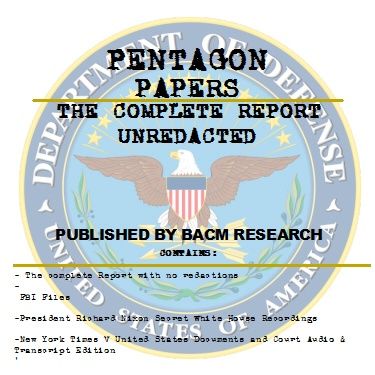




Pentagon Papers: DOD Files, FBI Records, Nixon Tapes, and Court Documents
$19.50
Description
The Pentagon Papers: A Chronology and Cast
Timeline of Events
- 1945-1967: The period covered by the “Report of the Office of the Secretary of Defense Vietnam Task Force,” which examines the evolution of U.S. involvement in Vietnam during this period, with a focus on the Kennedy and Johnson administrations. This document later became known as “The Pentagon Papers”.
- 1967: Secretary of Defense Robert S. McNamara orders the creation of the Vietnam Task Force to conduct a comprehensive study on the U.S. involvement in Vietnam.
- 1969, January 15: Leslie Gelb presents the completed Pentagon Papers report to Secretary of Defense Clark Clifford.
- 1969-1975: Henry Kissinger serves as National Security Advisor and subsequently as Secretary of State, during which time many of his conversations were transcribed, including those regarding the Pentagon Papers.
- 1971, February: President Nixon begins secretly recording conversations and telephone calls in various locations.
- 1971, Spring: Daniel Ellsberg, disillusioned with the war, copies major portions of the Pentagon Papers.
- 1971, June 13: The New York Times begins publishing excerpts from the Pentagon Papers.
- 1971, June 13-30: Nixon and his administration engage in discussions concerning the Pentagon Papers leak, as evidenced by the White House recordings, and begin their attempts to halt publication.
- 1971, June 14: Henry Kissinger tells Secretary of State William P. Rogers he was not aware of the existence of the Pentagon Papers. Kissinger and Nixon have a brief conversation about the leaks.
- 1971, June 15: Kissinger and Defense Secretary Melvin Laird discuss the leaks. Nixon and Kissinger discuss getting members of the President’s Foreign Intelligence Advisory Board to publicly condemn the leaks.
- 1971, June 16: RAND president Henry Rowen tells Kissinger that he believes Daniel Ellsberg is responsible for leaking the Pentagon Papers. William Jorden (a former aide to Walt Rostow) informs Kissinger that Lyndon Johnson does not want to publicly denounce the Pentagon Paper leaks.
- 1971, June 17: Kissinger tells Nixon not to push former President Johnson to conduct a press conference about the leaks. Nixon suggests Kissinger discuss the issue with Walt Rostow.
- 1971, June 18: Kissinger and Haldeman discuss whether Lyndon Johnson should make a statement about the leaks.
- 1971, June 21: John Ehrlichman discusses pursuing a restraining order to prevent further publication with Kissinger.
- 1971, June 21: The U.S. government submits the “Special Appendix” with claims about the impact of the Pentagon Papers’ publication on military operations, to the Court of Appeals for the Second Circuit, as well as submitting the “Griswold secret brief” to the Supreme Court detailing eleven national secrets they claim would be severely damaged.
- 1971, June 23: Former President Lyndon Johnson tells Kissinger that he is concerned that his book could contain classified information.
- 1971, Late June: Nixon’s “plumbers” break into the office of Daniel Ellsberg’s psychiatrist, Dr. Lewis J. Fielding.
- 1971, Late June: The U.S. Supreme Court hears oral arguments in the case New York Times v. United States.
- 1971, June 28: Kissinger confronts Time correspondent Jerry Schecter about a quote attributed to Daniel Ellsberg, alluding to Kissinger’s racism.
- 1971, August 6: The Congressional Research Service publishes summaries of articles in major newspapers covering the Pentagon Papers. Washington Post correspondent Don Oberdorfer asks Kissinger to clarify how the Papers would impact Kissinger’s recent trip to China.
- 1971, September 21: Kissinger complains about Congress publishing the Pentagon Papers.
- 1971, Undated: The CIA, at the request of the White House, provides E. Howard Hunt with alias documents and disguise materials, and prepares a psychological profile of Daniel Ellsberg.
- 1973, May 15: Theodore White and Henry Kissinger discuss the Pentagon Papers, the Watergate scandal and other issues related to the Nixon administration.
- 1973, June 5: Kissinger briefs Jack Anderson on the timeline of the Pentagon Papers leak, as well as the trip to China, and meetings related to wiretapping.
- 1975, January 4: President Gerald Ford creates the Commission on CIA Activities within the United States (the “Rockefeller Commission”).
- 1975, May: The Watergate Special Prosecution Force decides to question former President Richard Nixon regarding various investigations, including the leak of the Pentagon Papers.
- 1975, June 23-24: Nixon is questioned under oath regarding his role in the coverup of the Pentagon Paper leak and related actions.
Cast of Characters
- Daniel Ellsberg: Former Defense Department economist and RAND Corporation employee who leaked the Pentagon Papers to the press. He grew disillusioned with the Vietnam War.
- Robert S. McNamara: U.S. Secretary of Defense (1961-1968) who ordered the creation of the Vietnam Task Force that produced the Pentagon Papers.
- Leslie Gelb: Led the team of 36 that completed the Pentagon Papers report.
- Clark Clifford: Secretary of Defense (1968-1969) to whom the Pentagon Papers were presented in 1969.
- Richard Nixon: 37th President of the United States (1969-1974). His administration attempted to suppress the publication of the Pentagon Papers and conducted covert actions against Ellsberg.
- Henry Kissinger: National Security Advisor (1969-1975) and Secretary of State (1973-1977) under President Nixon and Ford. Key figure in White House discussions concerning the Pentagon Papers.
- H.R. Haldeman: White House Chief of Staff under President Nixon. Involved in discussions related to the Pentagon Papers leak and the Nixon administration’s response.
- John Ehrlichman: White House counsel and Assistant to the President for Domestic Affairs. Involved in attempts to legally block the publication of the Pentagon Papers.
- William P. Rogers: U.S. Secretary of State under President Nixon. Kissinger told him he was unaware of the Pentagon Papers.
- Melvin Laird: U.S. Secretary of Defense under President Nixon. Discussed the Pentagon Papers leak with Kissinger.
- Lyndon B. Johnson: 36th President of the United States (1963-1969) whose administration’s actions in Vietnam were scrutinized in the Pentagon Papers. He was hesitant to be involved in any public denouncements of the Pentagon Papers release.
- Walt Rostow: President Johnson’s National Security Advisor. Kissinger spoke with him about Johnson’s views on the Pentagon Papers leak.
- William Jorden: Former assistant to Walt Rostow who informed Kissinger that President Johnson did not want to be publicly involved in denouncing the Pentagon Paper leaks.
- Jack Anderson: Journalist who was briefed by Kissinger on the timeline of the Pentagon Papers leak.
- Ronald Ziegler: White House Press Secretary during Nixon’s presidency.
- Anatoly Dobrynin: Soviet Ambassador to the United States. Mentioned in Kissinger transcripts as a person with whom Kissinger had phone conversations.
- Nelson Rockefeller: New York Governor and later Vice President under President Ford. Chairman of the commission investigating CIA activities.
- George Romney: U.S. Secretary of Housing and Urban Development. Mentioned in Kissinger transcripts as a person with whom Kissinger had phone conversations.
- Joseph Califano: Special Assistant to President Johnson. Mentioned in Kissinger transcripts as a person with whom Kissinger had phone conversations.
- Jerry Schecter: Time magazine correspondent. Kissinger confronted him over a quote attributed to Daniel Ellsberg.
- Don Oberdorfer: Washington Post White House correspondent. Asked Kissinger about the impact of the Pentagon Papers on his trip to China.
- Henry Rowen: President of RAND who told Kissinger that he believed Daniel Ellsberg was responsible for the Pentagon Paper leak.
- Theodore White: Author who discussed the Pentagon Papers with Kissinger.
- E. Howard Hunt: Former CIA officer involved in the Watergate scandal, who was given resources by the CIA in an attempt to harm Ellsberg’s reputation.
- Lewis J. Fielding: Daniel Ellsberg’s psychiatrist whose office was broken into by Nixon’s “plumbers.”
- J. Edgar Hoover: Director of the FBI. He maintained a secret file on the Pentagon Papers.
- Helen Gandy: J. Edgar Hoover’s secretary who destroyed many of his secret files after his death.
- Gerald Ford: 38th President of the United States who created the Rockefeller Commission.
- George Hart: Chief Judge for the District of Columbia. Signed an order authorizing Nixon’s sworn deposition in California.
Vietnam War Pentagon Papers, DOD Files, FBI Files, Nixon Tapes & Court Documents
There are 8,968 pages consisting of Pentagon Papers, FBI files, court documents, transcripts from Kissinger, grand jury testimonies, summaries of media coverage, Nixon’s audio recordings, and an audio recording of Supreme Court oral arguments in the New York Times v. United States case, among other materials.
United States-Vietnam Relations, 1945-1967
The “Report of the Office of the Secretary of Defense Vietnam Task Force on United States – Vietnam Relations 1945-1967” was produced by the OSD Vietnam Task Force. In 1967, Secretary of Defense Robert S. McNamara initiated a comprehensive assessment of the U.S. involvement in the Vietnam War. A study team of thirty-six members was assembled, and a year later they finalized a report consisting of forty-seven volumes that included 4,000 pages of documentary evidence and 3,000 pages of analysis.
The extensive study outlines the U.S. involvement in Vietnam starting from the 1940s, with a primary concentration on the progression of the war during the presidencies of Kennedy and Johnson. It revealed that the Johnson Administration was covertly intensifying military actions in Vietnam while deceiving Congress, the American public, and U.S. allies. This revelation intensified opposition to the war and led to increased skepticism toward the government. Daniel Ellsberg, an employee at the RAND Corporation and a former economist for the Defense Department who became disillusioned with the Vietnam War, copied significant sections of a study and provided them to the media. However, the reports that emerged from these leaks were incomplete and had numerous quality issues. This event, which can be seen as a precursor to WikiLeaks, sparked a national conversation about press freedom and government transparency. On June 13, 1971, the New York Times started printing the Pentagon Papers, prompting the Nixon Administration to immediately attempt to halt further releases.
In their efforts to address the leaks, Nixon’s “plumbers” broke into Daniel Ellsberg’s psychiatrist’s office.
The Supreme Court ruled in favor of the New York Times and the Washington Post by upholding a lower court’s decision that the government had failed to demonstrate a sufficient reason to prevent the publication of the Pentagon Papers.
The collection includes:
Pentagon Papers
This is the full 7,000-page report without any redactions. It features all material that was unavailable before June 2011, totaling around 2,400 pages. This version of The Report matches the study presented by Leslie Gelb to Secretary of Defense Clark Clifford on January 15, 1969, and incorporates all supplementary background documentation. This release also contains the complete account of peace negotiations, with significant portions previously unavailable in both the redacted copy provided to the House Armed Services Committee and the Gravel Edition. It includes the entirety of Part VI, which Ellsberg and Russo did not leak; this section outlines various negotiating initiatives.
FBI Files Cross-references A collection of 48 pages from FBI documents related to the release of the Pentagon Papers and the break-in at Dr. Lewis J. Fielding’s office, who was Daniel Ellsberg’s psychiatrist. The files contain a memo regarding Walter Cronkite’s interview with Ellsberg during his time in hiding, a memo dated November 19, 1975, about reaching out to Cuban sources in Miami concerning rumors of a plot to kill journalist Jack Anderson and Ellsberg, along with biographical information on individuals connected to the Fielding break-in.
The Official & Confidential Pentagon Papers File by J. Edgar Hoover spans 18 pages. FBI Director J. Edgar Hoover kept a unique collection of FBI files in a secure location within his private office, separating them from standard FBI records to safeguard sensitive information. Following Hoover’s passing, his secretary, Helen Gandy, eliminated many of his confidential files. However, those pertaining to the Pentagon Papers leak and Daniel Ellsberg remained in a folder among the 15,000 pages of Hoover’s “Official and Confidential” documents that were preserved.
There are three hours and thirty-seven minutes of secret recordings made by President Richard Nixon, where he speaks about the release of the Pentagon Papers, Daniel Ellsberg, the New York Times, and the legal case New York Times v. United States, covering dates from June 13 to June 30, 1971. These discussions include exchanges between Nixon and notable figures such as Henry Kissinger, H.R. Haldeman, John Ehrlichman, Alexander Haig, John Mitchell, Charles Colson, and Secretary of State William Rogers.
In February 1971, President Nixon initiated secret audio recordings of discussions and phone calls in various settings, including the Oval Office, his Old Executive Office Building office, the Cabinet Room, and Camp David.
Transcripts of Henry Kissinger’s telephone calls and meetings are also included. The document consists of 189 pages of transcripts from phone calls and meetings involving Henry Kissinger, focusing on discussions related to the Pentagon Papers.
During his tenure as national security adviser (1969-1975) and secretary of state (1973-1977), Henry Kissinger had many of his phone calls and in-person discussions recorded by staff. This collection features around 70 conversations that addressed the leak of the Pentagon Papers.
The dialogues include contributions from: National Security Advisor and Secretary of State Henry Kissinger; President Richard Nixon; President Lyndon Johnson; White House Chief of Staff H.R. Haldeman; Secretary of State William P. Rogers; Secretary of Defense Melvin Laird; Former Secretary of Defense Robert McNamara; White House Counsel and Assistant to the President for Domestic Affairs John Ehrlichman; Journalist Jack Anderson; White House Press Secretary Ronald Ziegler; Soviet Ambassador Anatoly Dobrynin; New York Governor Nelson Rockefeller; HUD Secretary George Romney; Special Assistant to President Johnson Joseph Califano; and President Johnson’s National Security Advisor Walt Rostow.
Key excerpts from the transcripts include:
On June 14, 1971, a phone call memorandum shows Henry Kissinger informing Secretary of State William P. Rogers that he was unaware of the secret Defense Department history of the Vietnam War, later known as the “Pentagon Papers.”
On the same day, a conversation between President Nixon and Henry Kissinger briefly touches on the leak of the Pentagon Papers.
Later, on June 15, 1971, at 8:15 AM, Henry Kissinger talks with Secretary of Defense Melvin Laird regarding the Pentagon Papers leak.
That evening, at 7:20 PM, President Nixon and Henry Kissinger discuss the possibility of having members of the President’s Foreign Intelligence Advisory Board publicly denounce the leaking of the Pentagon Papers. On June 16, 1971, at 12:55 PM, RAND president Henry Rowen informs Kissinger that he suspects Daniel Ellsberg is behind the leak of the Pentagon Papers.
Later that day, at 3:04 PM, William Jorden, who was previously an assistant to Walt W. Rostow, President Lyndon B. Johnson’s national security adviser, tells Kissinger that Johnson prefers not to publicly condemn the Pentagon leak but offers alternative suggestions.
On June 17, 1971, at 7:40 PM, Kissinger shares with President Nixon that he should refrain from urging former President Johnson to hold a press conference regarding the Pentagon Papers release, and Nixon advises Kissinger to consult with Walt Rostow on the matter.
The next day, on June 18, 1971, at 1:50 PM, Kissinger and H.R. Haldeman discuss whether Lyndon Johnson should issue a public statement about the leak of the Pentagon Papers.
On June 21, 1971, at 1:56 PM, John Ehrlichman and Kissinger talk about the possibility of seeking a restraining order to stop the publication of the leaked Pentagon Papers.
On June 23, 1971, at 11:25 AM, former President Lyndon Johnson expresses to Kissinger his worry that his book might include classified information and emphasizes the need for a review to eliminate such content.
Finally, on June 28, 1971, at 3:42 PM, Kissinger informs Time magazine correspondent Jerry Schecter that a quote attributed to Daniel Ellsberg regarding Kissinger’s alleged “racist” comment is untrue and warns that he may withhold future information from Schecter. On August 6, 1971, at 6:00 PM, Washington Post White House reporter Oberdorfer asks Henry Kissinger to explain how the Pentagon Papers affected his visit to China in July 1971.
On September 21, 1971, at 10:50 AM, Henry Kissinger communicates with John Ehrlichman, expressing his discontent about Congress publishing the Pentagon Papers.
On May 15, 1973, at 9:23 AM, Theodore White and Henry Kissinger have a conversation regarding sections of White’s book on Richard Nixon that pertain to the Watergate scandal, Daniel Ellsberg, Kissinger’s views on Nguyen Van Thieu, and the Kennedy administration; they also talk about how Watergate has influenced public perception of President Nixon and the devaluation of U.S. currency abroad, with Kissinger mentioning W.W. Norton & Company’s censorship of Marvin and Bernard Kalb’s book concerning him.
On June 5, 1973, at 9:08 AM, Henry Kissinger provides Jack Anderson with details about the timeline of the Pentagon Papers leak, his covert trip to China, and the meetings intended for planning wiretaps; he claims he was unaware of any plans for wiretapping.
On June 24, 1975, former President Nixon was questioned by lawyers from the Watergate Special Prosecution Force (WSPF), who covered topics including the Pentagon Papers leak and Daniel Ellsberg during their 132-page transcript session. In May 1975, the Watergate Special Prosecution Force (WSPF) determined that it was essential to interrogate former President Richard M. Nixon regarding various ongoing investigations. Nixon was questioned over two days, June 23 and June 24, 1975, with his testimony being part of the investigations led by the January 7, 1974 Grand Jury for the District of Columbia, which was the third Watergate Grand Jury. Chief Judge George Hart issued an order permitting Nixon’s sworn deposition to take place at the Coast Guard Station in San Mateo, California, with two grand jury members present. This location was chosen because Nixon’s doctor had concluded that he could not travel to Washington, D.C., due to health issues.
The New York Times v. United States case includes 323 pages of legal documents. This case is recognized as a significant ruling by the U.S. Supreme Court concerning the First Amendment. The decision allowed the New York Times and Washington Post to publish the previously classified Pentagon Papers without facing government censorship or penalties. In a 6-3 ruling, the court stated that for the government to impose prior restraint (censorship before publication), it must provide enough evidence showing that releasing the documents would result in a “grave and irreparable” threat.
Included in the materials is the Griswold secret brief, which was kept confidential and designated as Top Secret by the Supreme Court. Solicitor General Erwin of the United States presented this report, which outlined 11 critical secrets that, if disclosed, the brief argued would inflict irreparable harm on U.S. national security. Special Appendix Related to In Camera Proceedings and Sealed Exhibits Submitted by Appellant United States, June 21, 1971. This “Special Appendix,” presented on June 21, 1971, to the U.S. Court of Appeals for the Second Circuit by the federal government, contains allegations about evidence based on the testimonies of various U.S. officials during court hearings in New York, along with assertions about the effects on ongoing military operations that would arise from disclosing the Pentagon Papers.
The court documents feature: The ruling and opinions from each Justice, the Brief for the United States, the Brief for the New York Times, the Brief for the Washington Post, and an Amicus brief submitted by 27 Congressional members.
New York Times v. United States Supreme Court Audio & Transcript
This includes an audio recording made by the Supreme Court capturing the full oral arguments in the case of New York Times v. United States from 1971 (No. 1873), along with a transcript of those arguments.
The Pentagon Papers as Reported by the American Press Major Newspaper Article Summaries
A 274-page report detailing how newspapers covered the Pentagon Papers. On August 6, 1971, the Foreign Affairs Division of the Congressional Research Service released summaries of articles published in leading newspapers that interpreted or analyzed the content of the Pentagon Papers, along with overall summaries of each newspaper’s series. This volume specifically addresses articles that examined and interpreted the Pentagon Papers, excluding the actual texts of the Pentagon Papers that were published by various newspapers. The report includes around 50 articles of varying lengths and about 150 documents, either in whole or in part, published by eight different newspapers. The newspapers are the New York Times, Washington Post, Boston Globe, Chicago Sun-Times, Christian Science Monitor, Los Angeles Times, Philadelphia Inquirer, and St. Louis Post-Dispatch.
The purpose of the summaries is to help Congress members, their staff, and constituents understand the key facts and interpretations of the Pentagon Papers as reported by the newspapers.
The Congressional Research Service (CRS) acts as a think tank for Congress and serves solely the United States Congress. It functions as the public policy research division of Congress, offering policy and legal analysis confidentially and without bias directly to Members of Congress, their Committees, and staff.
Summaries of Documents Published in the American Press
A 94-page report from the Foreign Affairs Division of the Congressional Research Service provides a list of the “Pentagon Papers” documents that appeared in the American media, along with brief descriptions of their content.
Rockefeller Commission Report U.S. President’s Commission on CIA Activities within the United States, Chapter 14, 33 pages – On January 4, 1975, President Gerald R. Ford established the Commission on CIA Activities within the United States. He tasked the Commission with assessing whether any domestic activities of the CIA went beyond the legal limits set for the Agency and to offer suitable recommendations. Vice President Nelson A. Rockefeller was appointed as the chairman of the Commission. It is commonly known as the “Rockefeller Commission.” Chapter 14 is titled “Involvement of the CIA in Improper Activities for the White House.” The report indicated that in 1971, at the request of individuals from the White House staff, the CIA provided E. Howard Hunt with false documents, disguise materials, a tape recorder, camera, film, and film processing services. Additionally, it fulfilled a request to create a psychological profile of Daniel Ellsberg.
Leslie H. Gelb LBJ Library Oral History Interview Transcript
Defense Secretary Robert McNamara selected Leslie Gelb to head the task force, which ultimately employed 36 personnel and took eighteen months to produce the document known as the Report of the OSD (Office of Secretary of Defense) Vietnam Task Force, titled United States-Vietnam Relations 1945-1967, commonly referred to as the Pentagon Papers.
CIA – FBIS Foreign Press Monitoring
This consists of 55 pages of translated reports from foreign press sources. These reports mainly cover broadcasts from North Vietnam. They include instances where the Pentagon Papers were used as propaganda against the United States. The reports detail broadcasts from Radio Hanoi, the North Vietnamese domestic wire service Viet-Nam News Agency, and Communist Vietnamese broadcasts targeting U.S. military personnel. The Foreign Broadcast Information Service (FBIS) was a part of the Central Intelligence Agency’s Directorate of Science and Technology that focused on open source intelligence. It tracked, translated, and shared news and information from foreign media sources that were publicly accessible with the U.S. government
Related products
-
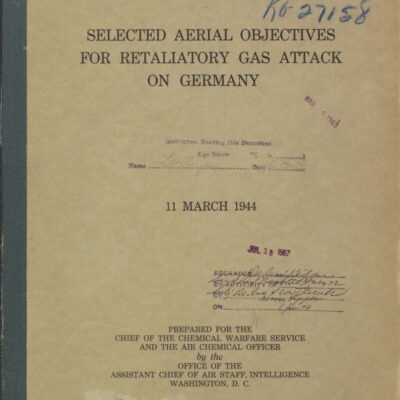
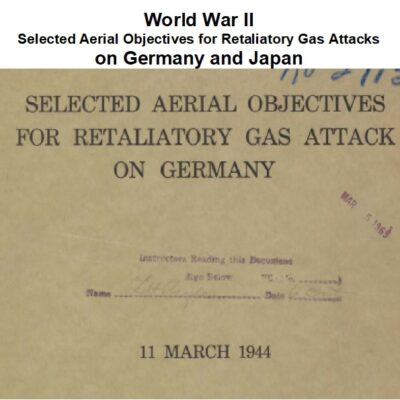
World War II: Targeted Aerial Objectives for Retaliatory Gas Attacks on Germany and Japan
$3.94 Add to Cart -
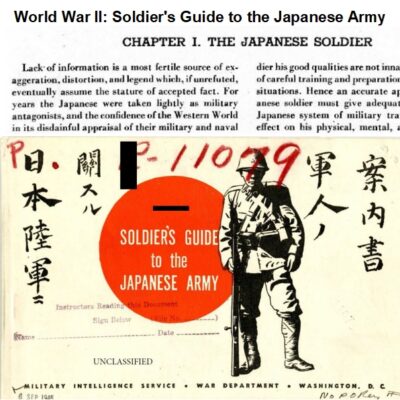

World War II: A Soldier’s Handbook on the Japanese Army
$3.94 Add to Cart -
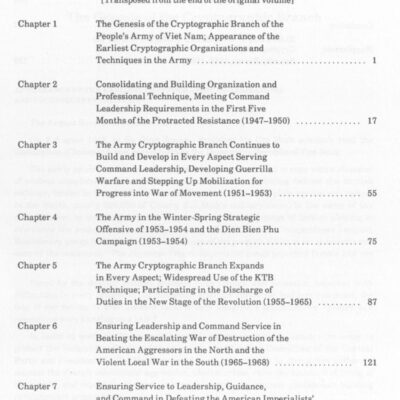
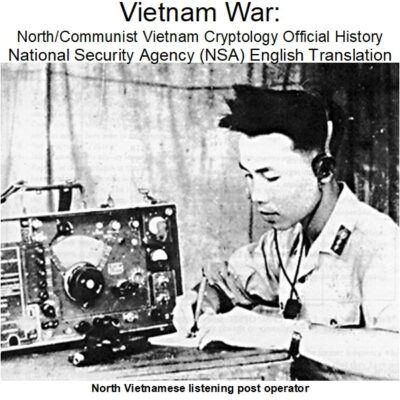
Vietnam War: Cryptology in North Vietnam – NSA Official History
$4.90 Add to Cart -
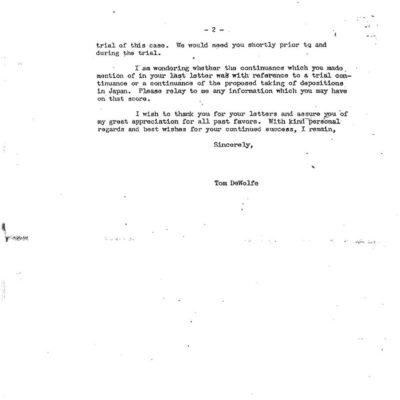
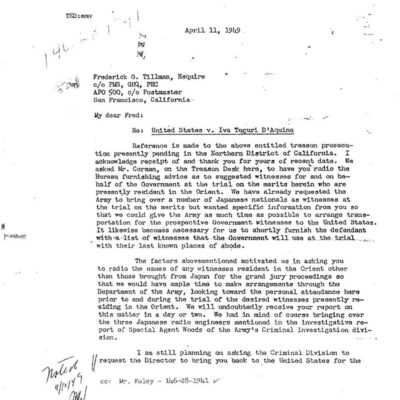
Tokyo Rose: Department of Justice Prosecution Files
$19.50 Add to Cart